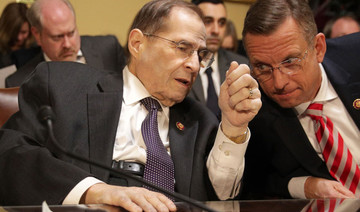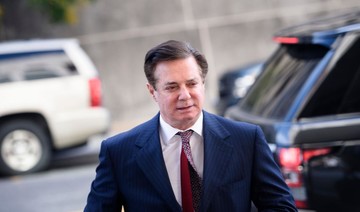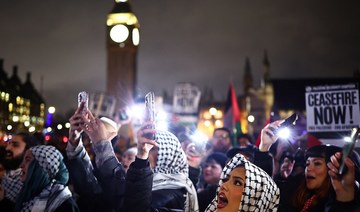WASHINGTON: President Donald Trump can’t get enough of Rep. Ilhan Omar.
As Democratic lawmakers try to turn the page after the liberal legislator’s use of anti-Semitic tropes ignited an embarrassing, intra-party fight, the Republican president is trying to prolong and weaponize the issue for his 2020 campaign, asserting during a private weekend fundraiser that Democrats “hate” Jews.
While Trump publicly muses about winning over Jewish voters for his re-election, his motivations are more complicated and expansive. The president’s rhetorical escalation also is designed to unsettle the Democratic primary debate, exploit an issue that can energize his supporters and move past his own history of toying in anti-Semitic motifs.
Trump on Tuesday promoted comments by former model and 2016 campaign staffer Elizabeth Pipko, who said on Fox & Friends that “Jewish people are leaving the Democratic Party.”
Pipko, who serves as spokesperson for the group “Jexodus,” which bills itself as speaking for “Jewish Millennials tired of living in bondage to leftist politics,” saw her comments amplified by Trump on Twitter. “There is anti-Semitism in the Democratic Party,” she continued. “They don’t care about Israel or the Jewish people.”
Her comments mirrored Trump’s charge on Friday that Democrats had become an “anti-Israel” and “anti-Jewish” party, responding to the House voted a day before to disapprove of all prejudice in response to Omar’s invocation of “dual-loyalty” charges against American supporters of Israel earlier this month.
Speaking later that evening, Trump went even further in an appearance before Republican National Committee donors, charging that Democrats “hate” Jewish people, according to a person who heard the remarks but spoke on condition of anonymity to describe the president’s comments at a private event.
Omar had sparked a political firestorm that derailed the Democrats’ focus on investigations of the Trump administration, including a public back-and-forth over how, or even if, her party should condemn her comments. The ultimate resolution, which passed the House overwhelmingly, didn’t call out Omar by name.
As a small percentage of the nation, American Jews are not a particularly significant voting bloc, nor is Israel their decisive issue of concern. And both parties acknowledge the controversy is unlikely to alter dramatically the electoral votes of the American Jewish community, which has skewed decisively toward Democrats for more than a generation.
Even a small shift, though, can be significant.
“We’re slicing the salami very thin, and an incremental shift in traditional Democratic blocs to the other side can have a profound impact,” said Matt Brooks, executive director of the Republican Jewish Coalition. He said his group plans to make “the largest investment that we’ve ever had in the 2020 race in terms of outreach, advocacy and independent expenditures on behalf of the president.”
Stoking the fight also gives Trump an opportunity to deflect criticism of his own rhetoric, invigorate evangelical Christians for whom the Israel issue is a powerful motivator and paint Democrats into a radical corner.
It also plays into Trump’s attempt to cast Democrats as radicals ahead of the 2020 campaign, said conservative commentator Seth Mandel, executive editor of the Washington Examiner magazine. He noted that Democratic Rep. Alexandria Ocasio-Cortez and Sen. Bernie Sanders pushed back against efforts to condemn Omar’s comments. “It makes it very easy to say they’re just adopting whatever the socialist says.”
White House press secretary Sarah Sanders kept the controversy alive on Monday by criticizing Democrats for failing to explicitly repudiate Omar.
“It’s something that should be called by name,” she said. “It shouldn’t be put in a watered-down resolution.”
Sanders pointed to Republican condemnation of Rep. Steve King earlier this year, including stripping the Iowa Republican of his committee memberships, after he made remarks defending white supremacy. But King had long espoused racially charged ideas, and the GOP only took action after it lost its majority in the chamber.
Minnesota Sen. Amy Klobuchar, who is running for the Democratic presidential nomination, warned that Trump’s politicization of the issue “threatens the bipartisan support for Israel.”
“The problem is that the president sees it somehow as a way to make some kind of political hay and a wedge,” she said. “And he keeps addressing it that way. And I just think it’s a mistake, as someone that’s a strong supporter of Israel, that he keeps doing it.”
Hallie Soifer, the executive director of the Jewish Democratic Council of America, said her group welcomes Trump’s focus on the issue of anti-Semitism. “He himself has emboldened anti-Semites in our country by both repeating anti-Semitic tropes and conspiracy theories,” she said. “He has no credibility with Jewish voters.”
Trump has been among the loudest critics of Omar, including last month when he called on her to resign from the House, or at least resign her post on the Foreign Affairs Committee over her suggestion that Jewish money drove support for Israel.
But Trump himself has repeatedly deployed some of the same tropes that sent fire toward Omar. He was slow to condemn white supremacists who marched violently in Charlottesville, Virginia, in 2017. In 2016 he circulated an image of a six-pointed star alongside a photo of Hillary Clinton, a pile of money and the words “most corrupt candidate ever.” And he told a group of Republican Jewish donors he didn’t expect to earn their support because he wouldn’t take their money.
“You want to control your politicians, that’s fine,” he told the Republican Jewish Coalition in 2015. Ultimately, the group and many of its donors backed Trump. Brooks said Trump’s comments were meant obviously in jest and any suggestion otherwise is “unfair and ridiculous.”
“Jexodus” is hardly the first time Trump has tried to peel away minority voters from the Democratic coalition. He has pushed the “WalkAway” and “Blexit” movements to win over black voters to the GOP, but those efforts proved to have limited, if any impact.
According to AP Votecast, a survey of more than 115,000 midterm voters and 3,500 Jewish voters nationwide, voters who identified as Jewish broke for Democrats over Republicans by a wide margin, 72 percent to 26 percent, in 2016.
Over the last decade, Jewish voters have shown stability in their partisanship, according to data from Pew Research Center. Jewish voters identify with or lean toward the Democratic Party over the Republican Party by a roughly 2-to-1 margin.
Trump sees advantage in debate over Israel, anti-Semitism
Trump sees advantage in debate over Israel, anti-Semitism
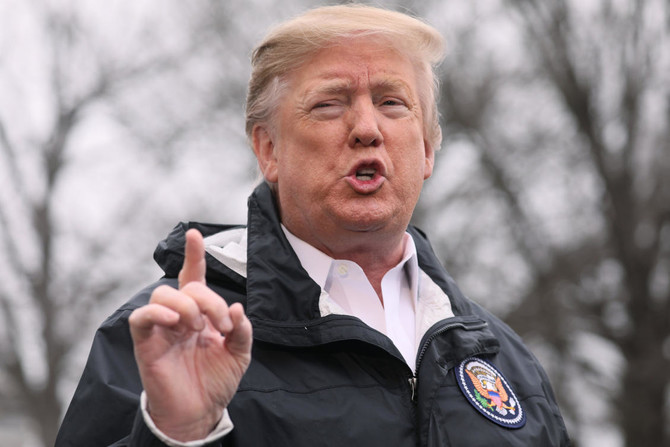
- While Trump publicly muses about winning over Jewish voters for his re-election, his motivations are more complicated and expansive
- Trump went even further in an appearance before Republican National Committee donors, charging that Democrats “hate” Jewish people
India BJP’s election videos targeting Muslims and opposition spark outrage
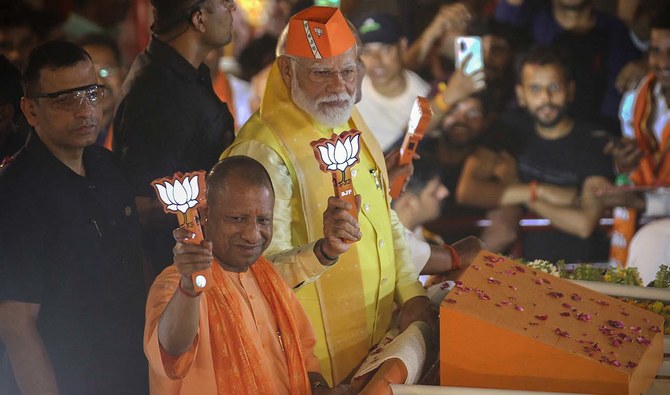
- Videos shared by BJP depict Congress giving disproportionate benefits to Muslims over tribal and Hindu groups
- Manipulated videos have become contentious issue in polls, such as fake videos of top Bollywood stars criticizing Modi
NEW DELHI, May 6 : Animated videos shared by Prime Minister Narendra Modi’s party targeting opposition Congress and the Muslim community have evoked complaints and outrage, as the political climate in India heats up midway through its six-week long election.
The videos, shared by the ruling Bharatiya Janata Party on social media platforms Instagram and X over the last ten days, depict the Congress giving disproportionate benefits to India’s minority Muslim community, at the cost of certain disadvantaged tribal and Hindu caste groups.
The Congress, in a complaint to the poll watchdog Election Commission, said on Sunday that the video has been shared “clearly with an intention to wantonly provocate rioting and promote enmity between different religions.”
A set of guidelines mutually adopted by political parties for how they should conduct themselves during the election period prohibit them from creating “mutual hatred” between caste, religious or linguistic groups.
Manipulated videos on social media have also become a contentious issue in this election, such as fake videos showing top Bollywood stars criticizing the prime minister.
On Monday, the commission warned parties against the misuse of AI tools to create deep fakes and told them not to publish and circulate such videos. It also said parties had been directed to remove such content within three hours of it being brought to their notice.
Modi, the face of the Hindu-nationalist BJP, seeking a rare third consecutive term, had focused his campaign largely on his government’s performance on economic growth and welfare benefits.
But he changed tack after the first phase of voting on April 19 and his campaign speeches have since become more polarizing on religious lines, accusing Congress of planning to redistribute the wealth of the majority Hindus among minority Muslims, who he called “infiltrators” who have “more children.”
The videos shared by the BJP over the last ten days, one of which has since been taken down, illustrated the same message.
A 17-second video shared by a state unit of BJP on May 4, with over 8.5 million views, shows a character resembling Congress leader Rahul Gandhi feeding “funds” to a bird in a skullcap, which eventually pushes out from their common nest three other birds representing other disadvantaged groups.
The Congress has filed a police complaint against BJP leaders for the video, BJP’s head of information and technology Amit Malviya said on X.
“The Congress should in fact thank the BJP for taking their manifesto to the people in a manner that even they couldn’t,” he wrote.
The video has elicited outrage. Nitasha Kaul, a politics professor at London’s Westminster University said on X that the video was a “straightforward 1930s Germany style cartoon.”
In its manifesto for the elections, the Congress has promised to tackle India’s economic inequality by conducting a socio-economic caste census and extending affirmative action. It said it will ensure that minorities receive “their fair share” of education, economic and health care opportunities.
An Election Commission spokesperson, the BJP’s Malviya and Congress spokespersons did not respond to requests seeking comment.
Bangladeshi students rally in solidarity with global student movement against Israel
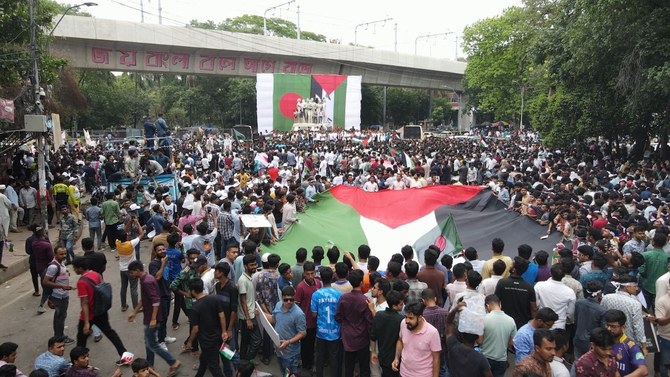
- US student protests have sparked more around the world, including in India, France, Australia
- Dhaka’s thousands-strong rally took place at Bangladesh’s largest, oldest tertiary institution
DHAKA: Thousands of people protesting Israel’s war on Gaza rallied at one of Bangladesh’s top universities on Monday in solidarity with the student-led protests and occupations sweeping the globe.
Pro-Palestinian student leaders and activists from different universities marched and carried flags of Bangladesh and Palestine, chanting slogans in solidarity with Gaza as they made their way to Dhaka University, Bangladesh’s largest and oldest tertiary institution.
Their protest culminated at the symbolic Aparajeyo Bangla sculpture, one of the most well-known landmarks dedicated to the Bangladesh Liberation War of 1971.
“Our stance is very clear: We express solidarity in support of a free Palestine state, in favor of a world free from war. And we support the demands made by US students, like divestment from Israel and other organizations that support the Israeli aggression,” Saddam Hussain, president of the organizing student group Bangladesh Students’ League, told Arab News.
They are also rallying in solidarity with the global student movement, he added.
“We believe all protests hold the same spirit of the youth, be it on the banks of the Atlantic or here on the bank of River Padma,” he said.
“The youths around the world have a common dream, and I urge all of them to move forward to make this dream come true. I hope all the youths of the world will join in this protest to build a world free from war, free and guided with humanitarian spirit.”
The Israeli strikes on Gaza that began in October have killed nearly 35,000 people in the Palestinian territory, mostly women and children. The leader of the World Food Program said over the weekend that parts of the Gaza strip were experiencing a “full-blown famine” that was spreading across the besieged enclave.
Students started to rally or set up tents at various universities around the US last month to protest Israel’s war on Gaza, sparking a global solidarity movement among the youth in India, Australia, France and elsewhere, with many putting pressure on their administrators and governments to cut ties with Tel Aviv.
While US colleges have seen protests since October, the unrest has escalated in recent weeks after police arrested pro-Palestine demonstrators at an encampment in Columbia University, sparking even more campsites at other campuses, as well as more crackdowns and arrests.
Unlike in the US, students in Dhaka were able to protest peacefully with scant police presence.
“The US and some other big players always speak in favor of freedom of speech. But what we have seen in the university campuses in the US is a shame for world leaders,” Solaiman Khan, a 23-year-old Dhaka University student, told Arab News.
“It’s a double standard. We, the youth (of Bangladesh), came out to the streets against this sort of hypocrisy from the superpowers of the world.”
Khan said the violence against Palestinians must be “stopped now and forever.”
“We have seen enough atrocities done by the Israeli forces. How many more lives must the world lose? Is it not enough?” he said.
“I think world leaders should come to their senses and act more rationally in stopping the atrocities in Gaza orchestrated by the occupying Israeli forces. Now is the time to play a decisive role. Otherwise, the next generation will not forgive us.”
Pro-Palestine Oxbridge students set up encampments

- They are demanding transparency about the universities’ financial links to Israel
- ‘We will not move until our demands are met’
LONDON: Students at the universities of Oxford and Cambridge have set up encampments in support of Palestine, The Times reported on Monday.
Around 50 have refused to leave the lawn of King’s College, Cambridge, while students have also declared a “liberated zone” outside Oxford’s Pitt Rivers Museum.
A banner hung outside King’s College read: “Welcome to the people’s university for Palestine.” Chants of “stop the bombing now” have also been heard on the campus.
The protests have been organized by Oxford Action for Palestine and Cambridge for Palestine.
They are demanding transparency about the universities’ financial links to Israel, which they have described as a “settler colonial state,” and are calling for the end of all investments and endowments from Israeli and Israel-linked companies.
“We have set up camp in university grounds, and we will not move until our demands are met,” the groups said in a statement, adding that the universities are legitimate targets for protests because of their “role in the British empire and its disastrous colonial legacies.”
The Times reported that protesters had been given an itinerary for their involvement including “de-escalation training” and “banner-making.”
A spokesperson for Cambridge University said it is for the college to decide whether to call the police, adding: “The university is fully committed to academic freedom and freedom of speech within the law and we acknowledge the right to protest.
“We ask everyone in our community to treat each other with understanding and empathy. Our priority is the safety of all staff and students.
“We will not tolerate antisemitism, Islamophobia and any other form of racial or religious hatred, or other unlawful activity.”
The relatively small UK protests come after nearly 2,000 people were arrested across the US after widespread demonstrations on over 130 American university campuses about Israel’s ongoing war in Gaza.
Muslim group issues UK Labour Party leader with demands over Gaza
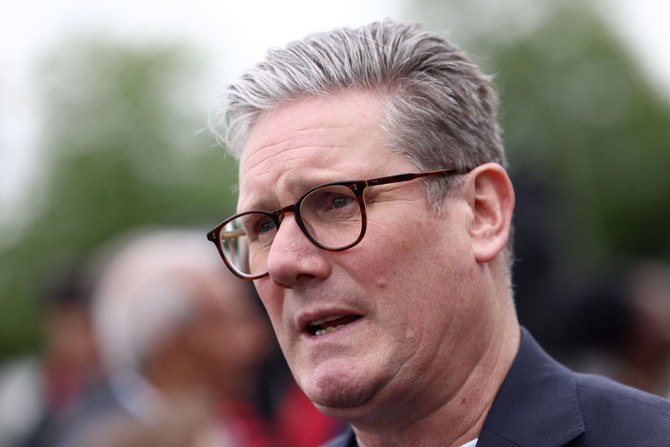
- Muslim Vote group calls for ‘real action’ to regain trust
- Support for Labour in recent local elections fell in areas with high Muslim populations
LONDON: Pro-Palestinian activists have presented a list of 18 demands to the leader of Britain’s opposition Labour Party and said they will not vote for the party at the next general election if he does not fulfill them.
The Muslim Vote, a campaign to get Muslim voters to back pro-Palestine candidates, has called for Sir Keir Starmer to promise to cut military ties with Israel, implement a travel ban on Israeli politicians involved in the war in Gaza and impose sanctions on companies operating in occupied territories.
The group told Starmer he must commit to “real action” and deliver on its requests if he was “serious” about his pledge to rebuild trust with those angered by his stance on the conflict in Gaza, The Telegraph reported.
Supporters would vote for the Green Party or Liberal Democrats if he could not commit to their demands, it said.
Labour’s campaign chief Pat McFadden acknowledged that Starmer’s approach to the conflict had cost the party votes at last week’s local elections. Support for Labour dropped dramatically in areas with a high Muslim populations, including Oldham in Greater Manchester, where the party lost overall control of the council in a shock defeat.
After the result, Starmer said he was determined to regain the trust of those who abandoned Labour as a result of his stance on the Gaza war but did not make any concrete pledges on the matter.
The Muslim Vote challenged Starmer with committing to the 18 demands and implementing them should he become the next prime minister.
They include removing the definition of extremism introduced by Secretary of State for Leveling Up, Housing and Communities Michael Gove and issuing guidance that allows Muslims to pray at school.
Philippines rules out use of water cannon in disputed South China Sea

- Philippines and China have clashed several times in disputed, resource-rich waterway
- Latest skirmish took place late last month, in an incident Manila describes as dangerous
MANILA: President Ferdinand Marcos Jr. said on Monday that Manila will not use offensive equipment in the disputed South China Sea, after China’s coast guard used high-pressure water cannon on Philippine vessels last week.
The Philippines and China have had several confrontations in the resource-rich area, where Beijing has used water cannon against Filipino vessels in incidents Manila has described as harassment and dangerous.
The latest in a string of maritime clashes occurred on April 30 as tensions continued to rise in the vital waterway that Beijing claims almost in its entirety despite a 2016 international arbitration ruling that rejected its assertion.
“What we are doing is defending our sovereign rights and our sovereignty in the West Philippine Sea. And we have no intention of attacking anyone with water cannons or any other such offensive (weapons),” Marcos said Monday.
“We will not follow the Chinese coast guard and the Chinese vessels down that road because it is not the mission of the navy (or) our coast guard to start or to increase tensions … Their mission is precisely the opposite, it’s to lower tensions.”
Philippine vessels have been regularly targeted by Chinese ships in areas of the South China Sea that are internationally recognized as belonging to the Philippines, which Manila calls the West Philippine Sea.
The Philippines’ Ministry of Foreign Affairs last Thursday summoned Zhou Zhiyong, China’s deputy chief of mission, after the incident left a Philippine coast guard vessel and another government boat damaged.
It was the 20th protest Manila has made against Beijing’s conduct in the South China Sea this year alone, while more than 150 diplomatic complaints have been made over the past two years.
Marcos said the Philippines will continue to respond to South China Sea incidents through diplomatic means.
Marcos’s statement comes days after the defense ministers of the Philippines, the US, Japan and Australia met in Hawaii and issued a joint statement on their strong objections to the “dangerous and destabilizing conduct” of China in the South China Sea.


